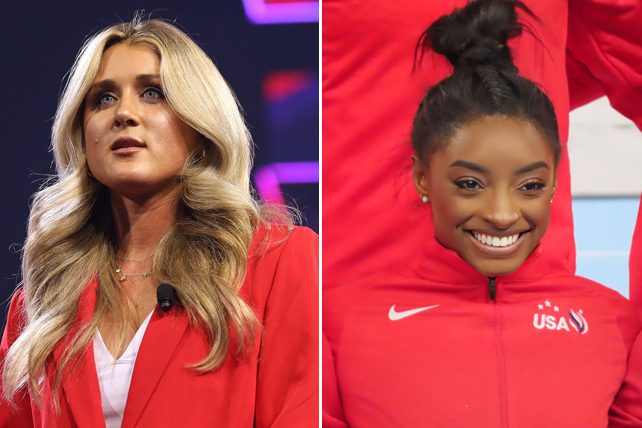Two teenage female athletes who are part of a lawsuit filed July 7 in the state of Oregon over laws allowing trans athletes to compete in women’s sports say that the public reaction after Simone Biles attacked Riley Gaines encouraged them to move forward with the suit.
“As we’ve worked towards this lawsuit, I think as more time has gone on, I’ve felt more and more confident in what we’re doing,” said Sophia Carpenter in a video posted by Jackson Thompson of Fox News.
“Especially when Riley Gaines and Simone Biles, when that whole thing happened,” she said, “and kind of seeing how that played out and how the public responded—I think that was encouraging to see how many people are on the side of protecting women’s sports.”
“I would agree that scenario was very timely for filing this lawsuit,” said Maddie Eischen, “and I agree with Sophia that it was super encouraging to just see Riley just stay strong, have the supporters that really count…that definitely affirmed that I have people out there for me.”
Riley Gaines Encourages Oregon Athletes To File Lawsuit
The America First Policy Institute (AFPI) filed a federal lawsuit on behalf of three high school girls in Oregon on the grounds that the girls’ rights under Title IX were violated “because they were forced to compete against males in events reserved for girls.”
In a video on AFPI’s website, Carpenter, Eischen, and a girl named Reese Eckhard share their experiences competing against trans athletes, explaining how demoralizing that was for them. All three girls decided to protest by withdrawing from competition.
Eischen, who is 18, is listed as a plaintiff in the lawsuit. Other plaintiffs are Adam and Rebecca Carpenter, guardians of S.N.C., and Tiffany and Randy Castaneda, guardians of S.C. Defendants include the Oregon Department of Education, Oregon School Activities Association, and Oregon Gov. Tina Kotek.
The lawsuit claims sex discrimination under Title IX and describes the distress the girls say they experienced competing against biological males. The suit alleges that privileges were afforded to the trans athletes that were not provided to the female athletes who were competing and describes tense environments caused by the trans athletes’ police escorts.

